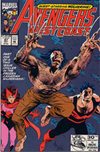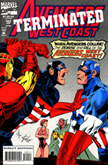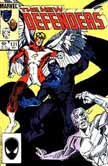In With the X-Crowd
By Philip Schweier
November 14, 2005 - 13:46
Marvel’s House of M, Decimation event promises sweeping changes for the Marvel Universe. Scuttlebutt is that the number of mutants will significantly diminish, an idea that is long overdue.
One might think I’m no fan of the X-Men, but quite the opposite actually. Having had the good fortune to follow Dave Cockrum from DC’s Legion of Super-Heroes, I was a big fan of the team following Giant-Size X-Men #1. I’m sure we all remember the closing comment of that landmark issue: “What are we going to do with 13 X-Men?” Perhaps they should’ve given that question more thought, as Marvel eventually painted itself into a creative corner.
On the DVD for X2:X-Men United, Stan Lee explains that he couldn’t have everyone bitten by radioactive spiders or dosed with gamma rays. “So I took the easy way out,” he says. “If I say they’re a mutant, there’s no need for further explanation.”
As mutant mania exploded, Marvel seemed to capitalize on the phenomenon a bit too eagerly. I lost interest sometime in the mid-‘80s, when it seemed that anyone with any kind of talent was a mutant. Forge could invent anything; there was a kid in the New Mutants who had a gift for languages. Some might view these gifts as lame, but it’s inevitable that some mutant abilities are more passive than others. Either way, it doesn’t exactly make for exciting story telling. This is when I decided the House of Ideas to be creatively bankrupt.
 |
“Dog bites man – that’s not a story. Man bites dog – THAT’s a story. And if the dog and the man slug it out for six issues, and then Wolverine shows up for a guest appearance, and the dog turns out to be a mutant, that’s a MARVEL story!”
 |
I’ve always appreciated the X-Men as an allegory for the disenfranchised. They’ve scaled new heights in comic book team dynamics, moving beyond the “family” atmosphere pioneered by the Fantastic Four. The average person acts differently among peers, family, in school, at work and on sports teams, and the X-Men has portrayed such facets admirably. Which is why I hate to see the group serve as a sort of stepping-stone for third-tier characters.
 |
These long-term effects – or lack thereof – of their editorial policy brings me to my point. Building a character’s popularity based on who they are associated with is building a house of cards indeed. Anyone who has ever been to high school will tell you that hanging out with the “cool kids,” does not automatically make you a “cool kid” yourself. It just makes one a parasite on the behind of “the in crowd,” riding the coattails of popularity merely by the fortune of being there. That popularity almost always fades when the association is severed. And all that is left to judge is our own merits.
Ultimately, any book must be judged on the quality of the story it tells, or the content of its characters. A team book should have an ample cast for a writer to craft an interesting and entertaining story. If it takes a guest-star to temporarily lift the book out of the doldrums, then obviously the cast of the title is weak, and some changes need to be made.
Fortunately, Marvel’s undergone a few management changes since the demise of Avengers West Coast. With last year’s Avengers Dis-Assembled story, and this year’s House of M event, the company appears to be streamlining some 40+ years of continuity.
Some fans have argued on message boards and blogs across the Internet that it’s little more than editorial tampering. Perhaps, but it’s been said that every 15-20 years, comics need an enema. The idea is not to tamper with our beloved heroes. It’s to update the long-term characters for subsequent generations.
“What’s the alternative? Stagnation. A safer, more terrible form of death. Not of the body but of the spirit...” -Wolverine mini-series, 1982
In any creative effort, there can be very few sacred cows. It limits the ability to tell fresh stories to new audiences, especially if the comic book community is to grow and prosper. Some ideas were suitable for their time, and as years go, they need to be tweaked and adjusted. Some, sad to say, are best forgotten.
Ultimately, it should be a simple matter of trimming away any extraneous baggage from 40+ years ago, thereby boiling a concept down to it’s bare essence, with plenty of action and strong characterization.
Now THAT’S a Marvel story. •
Praise and adulation? Scorn & ridicule? email me at philip@comicbookbin.com
Related Articles:
X-Men: The Evolution of a Revolution
A History of The Westcoast Avengers and Their Modern Relevance
Related Articles:
Astonishing X-Men Cyclops
Review: X-Men God Loves, Man Kills Extended Cut
X-Men Dark Phoenix – the Rebirth of a Franchise?
Review: Astonishing X-Men #7
X-Men: Grand Design #1 comics review
Review: X-Men Gold #9
X-Men Gold #2 And The Rebirth of Progressivism at Marvel Comics?!
X-Men Gold #1 and the Death of Progessivism at Marvel Comics
Marvel's X-Men Separate But Equal
Review: Amazing X-Men #8
